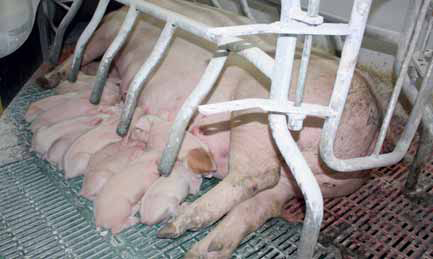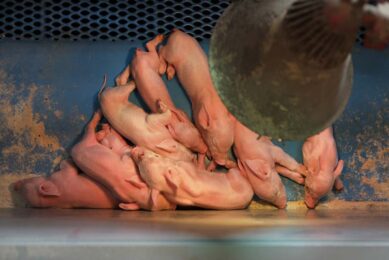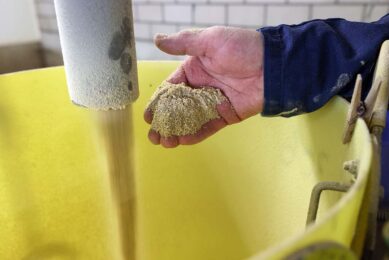Potato peptides improve piglet performance

Potatoes have long been known as an ingredient pigs like. But apart from feeding the skins, there appear to be more ways of profiting from potatoes. When potato proteins undergo fermentation, a stronger benefit from potatoes has been shown. In piglets, feeding fermented potato protein has shown some good results.
Sow productivity has increased over the years and the number of weaned piglets per sow per year is an important parameter in measuring productivity and genetic selection. Profound selection on the number of piglets born per litter, however, has a downside: large numbers of embryos in the uterus can restrict the embryo nutrient supply resulting in a lower birth weight. This will have a negative impact on the pre-weaning survivability (mortality during the first five days of life) of neonatal piglets.
Therefore, research should focus on products and techniques that can reduce pre-weaning piglet mortality. Genetics, environment, management and nutritional factors all play a crucial role in neonatal piglet survivability. Newborn piglets with a lower birth weight have very limited energy reserves, in the form of glycogen stored in the muscle and the liver. It is of vital importance that colostrum intake is stimulated as soon as possible after farrowing to ensure a rapid supply of energy and immunoprotection to the piglets.Recent research showed that a combination of several feedstuffs, or even single feed supplements like medium chain fatty acids, immunoglobulins, fermented potato protein can improve neonatal piglet survivability.
Medium chain fatty acids are highly digestible energy sources to boost the limited energy reserves of newborn piglets. They also offer benefits beyond their energetic value and can affect the bacterial microflora gut ecosystem. Immunoglobulins originating from whey or egg sources are another well-studied example of feedstuffs that can be used to reduce pre-weaning mortality.
Fermented potato protein
Animal health company Huvepharma recently introduced Lianol, a product range based on a highly digestible fermented potato protein. During the production process, a specific bacterial strain ferments the potato protein into bio-active peptides. These bio-active peptides have the quality to influence IGF-1 (Insulin-like Growth Factor 1) levels in animals. IGF-1 secretion is the key element in a complex endocrine process which is determined by several glands. The most important one is the pituitary gland, secreting growth hormone (GH). This GH secretion is directed by a specific release hormone. It enters the bloodstream, from where it reaches the liver and activates a number of GH receptors (GHR), determining the level of IGF-1 secretion (see Figure 1). IGF-1 is involved in many metabolic processes including fertility, tissue repair (muscle, bones, etc.), containing and regulating the heart muscle function and body fat.
IGF-1 secretion by liver cells can be affected by several factors, like immune system activation due to infections, inflammation or viruses. Heat stress or a negative energy balance also reduce GH receptor sensitivity (see Figure 1) leading to reduced levels of IGF-1. This reduction in sensitivity is induced through transcriptional gene silencing of the genes that encode for the GHR. In newborn piglets, a negative energy balance is common especially among lightweight piglets. As a result, these small piglets will have difficulties in growing and surviving. After birth, IGF-1 has a dominant role in regulating growth. The fermented potato protein exerts a beneficial effect on IGF-1 in newborn piglets. This benefit results in a reduction in neonatal piglet mortality.To demonstrate the effect of fermented potato protein on the IGF-1 levels in neonatal piglets, a university study was set up at Tests&Trials, located in Lleida, Spain. In this trial a group of 261 newborn piglets were orally fed fermented potato protein immediately after birth. A control group of 130 newborn piglets were not treated. Blood serum was collected in 57 control animals and in 124 treated animals on the day of birth and seven days later. IGF-1 levels were analysed. Piglet mortality was recorded daily.
Administering fermented potato protein resulted in a 44% increase in IGF-1 levels compared to the control group. In piglets with a birth weight lower than 1.2 kg, this difference was even more pronounced. In this group, the fermented potato protein generated an increase in IGF-1 of more than 300%, compared to the control group (see Figure 2). Birth weight is a predisposing factor in piglet pre-weaning mortality. This mortality could be related to the lack of increase in IGF-1 plasma levels. IGF-1 influences many cell functions and is considered to have an important anabolic and metabolic regulatory function. Another action of IGF-1 which is complementary to its stimulatory effect on cell proliferation, is its capacity to inhibit programmed cell death (apoptosis) in certain cells. In this trial a 25% reduction in mortality was observed. A hypothesis explaining this reduced mortality is that piglets receiving fermented potato protein are more vigorous and more stimulated to ingest sow colostrum. A higher colostrum intake immediately after birth will result in better maternal immunity as well as better piglet growth, and higher piglet survival.
Colostrum intake
To check this hypothesis, a second trial was conducted at the Pig Innovation Centre Sterksel in the Netherlands. A group of 504 piglets was divided into a control and a treatment group receiving the fermented potato protein. All were allocated to a treatment within a litter. Piglets were weaned at 27 days. At day 4, the plasma IgG (immunoglobulin G) content was determined and piglet mortality was recorded daily.
The IgG levels in the treated piglets were significantly higher (see Figure 3) and were the results of a higher colostrum intake just after birth. This supported the hypothesis that fermented potato protein can stimulate the colostrum intake of newborn piglets. As a result, the mortality in the treatment group was almost 20% lower compared to the control group. In short, with genetic selection for bigger litter sizes, the pre-weaning survivability will become an increasingly important welfare and economic parameter. Any natural solution that may help to overcome this problem will address the calls for more sustainable and animal friendly production.
www.huvepharma.com
Visit us at Eurotier Hall 15 stand C41
Visit us at Eurotier Hall 15 stand C41
Join 18,000+ subscribers
Subscribe to our newsletter to stay updated about all the need-to-know content in the pigsector, three times a week. Beheer
Beheer










 WP Admin
WP Admin  Bewerk bericht
Bewerk bericht